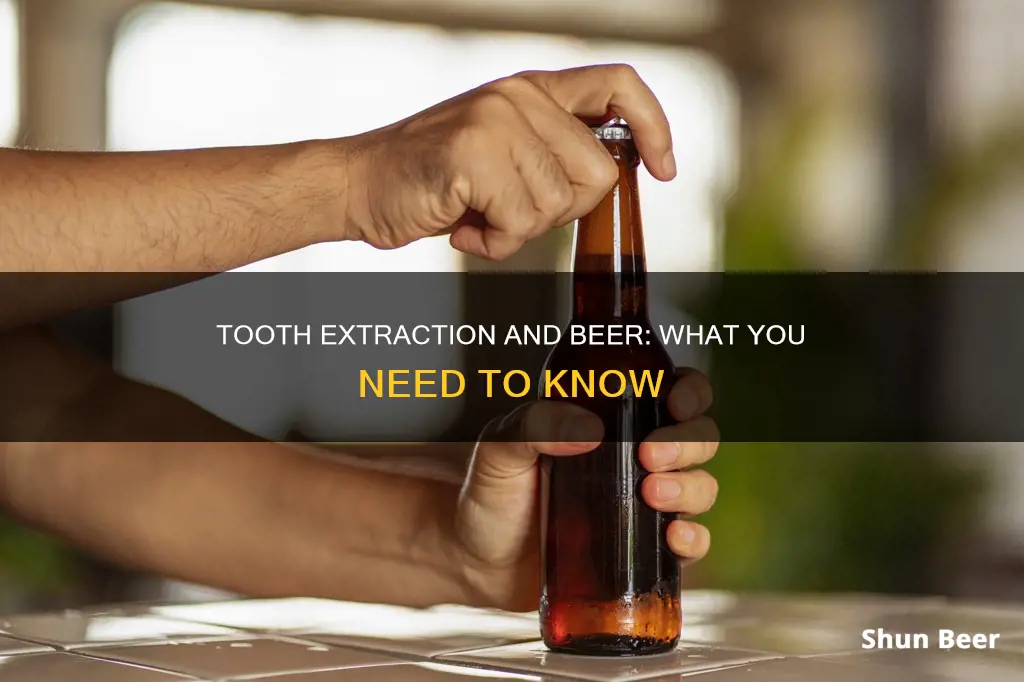
Getting a tooth pulled can be a stressful experience, and it's understandable if you want to unwind with a beer afterward. However, drinking alcohol after a tooth extraction is not recommended and can negatively impact your recovery process. Here's what you need to know about drinking beer after having a tooth pulled.
| Characteristics | Values |
|---|---|
| Drinking alcohol after a tooth extraction | Not recommended |
| Reason | Hinders healing and recovery, thins blood, increases risk of infection, causes dehydration, interferes with pain medication |
| Healing time | 7-10 days |
| Suggested drink | Water |
| Drinking straws | Not recommended |
| Smoking | Avoid for at least 3 days |
What You'll Learn

Dentists recommend avoiding alcohol after tooth extraction
After a tooth extraction, it is only natural to want to relax and unwind. However, dentists recommend that you avoid consuming alcohol after the procedure. Here are several reasons why you should abstain from alcohol and some helpful tips for a smooth and speedy recovery.
The Risks of Alcohol After Tooth Extraction
The primary concern with drinking alcohol after a tooth extraction is the disruption of the blood clotting process. When a tooth is removed, a blood clot must form in the extraction area to initiate the healing process. This typically takes about a week, and drinking alcohol during this critical period can hinder the formation of the clot. Alcohol is known to thin the blood, preventing it from clotting properly.
Complications: Dry Socket
If the blood does not clot or the clot dislodges prematurely, you may develop a condition called "dry socket." Dry socket is a painful complication where the nerves and bones near the extraction site become exposed, making you vulnerable to bacterial infection. This condition significantly slows down your recovery and can cause radiating pain throughout your mouth and face.
Dehydration and Medication Interactions
In addition to the risk of dry socket, consuming alcohol after a tooth extraction can lead to dehydration, further impeding the healing process. Alcohol inhibits the body's natural inflammatory response and collagen production, which are essential for wound healing. Dehydration can also affect the stability of the blood clot.
Furthermore, if you are taking pain medications, mixing them with alcohol can be dangerous. Alcohol can increase the risk of negative side effects and interactions with painkillers, such as dizziness, nausea, and impaired judgment. It is best to wait until you no longer need pain medication before resuming alcohol consumption.
Recommendations for a Smooth Recovery
To ensure a smooth and quick recovery after a tooth extraction, follow these recommendations:
- Get plenty of rest for at least 24 hours after the procedure.
- Use ice packs or cold compresses to reduce swelling and discomfort.
- Avoid using straws and spitting for at least 24 hours to prevent dislodging the blood clot.
- Stay hydrated by drinking plenty of water. Avoid alcoholic and caffeinated beverages.
- Eat nutritious, soft foods that are easy to chew and promote healing.
- Maintain good oral hygiene by gently brushing and flossing, being careful not to disturb the extraction site.
- Refrain from smoking or using tobacco products for at least three days.
- Follow your dentist's aftercare instructions and contact them if you have any concerns or persistent symptoms.
By following these guidelines and abstaining from alcohol, you can promote a healthy and speedy recovery after a tooth extraction. Your dentist can advise you on the specific timeline for resuming alcohol consumption based on your individual healing progress.
Non-Alcoholic Beer and Islam: What's the Verdict?
You may want to see also

Alcohol hinders the healing process
Alcohol consumption can increase the risk of dry socket as it thins the blood and inhibits clot formation. This can lead to a delay in healing and cause discomfort. In addition, alcohol can cause dehydration, which can further hinder the healing process as the body requires adequate hydration to form blood clots effectively.
Furthermore, drinking alcohol while taking pain medication can increase the risk of negative side effects and interactions. It is recommended to wait until you no longer require pain medication before resuming alcohol consumption.
To promote a smooth and speedy recovery after a tooth extraction, it is best to avoid alcohol consumption and follow your dentist's aftercare instructions. This includes maintaining good oral hygiene, getting plenty of rest, and staying hydrated by drinking water or lukewarm tea.
Drinking Beer While Driving: What's the Legal Ruling?
You may want to see also

Drinking alcohol while taking pain medication can be dangerous
After a tooth extraction, it's best to avoid drinking alcohol, as it can have adverse effects on your healing time. Alcohol can cause dehydration and may inhibit the healing process, potentially leading to complications such as a dry socket or infection.
However, the main concern when it comes to drinking alcohol after a tooth extraction is the interaction with pain medication. It is common to experience discomfort following a tooth extraction and you may be taking pain medication to help manage this. Both prescription and over-the-counter painkillers can interact with alcohol, leading to dangerous and unexpected side effects, including organ damage, loss of consciousness, and even death.
Many common painkillers, both prescription and over-the-counter, will have a warning label advising against mixing them with alcohol. This warning should always be heeded as mixing alcohol and pain medication can cause dangerous, unexpected side effects, including organ damage, loss of consciousness, and even death.
- Tylenol (acetaminophen): Taking large doses of Tylenol or mixing it with alcohol can lead to irreversible liver damage.
- Ibuprofen (Advil, Motrin, Midol): Drinking alcohol while taking these anti-inflammatory drugs can increase the risk of stomach problems, including gastrointestinal bleeding.
- Aspirin: Regularly using aspirin and alcohol together can increase the risk of internal bleeding, stroke, or kidney failure.
- Opioids (Vicodin, Percocet, Oxycontin): Mixing opioids with alcohol can cause severe respiratory depression, sedation, and a heightened risk of overdose. Alcohol enhances the effects of opioids, leading to a more intense high but also making you extremely drowsy. This can cause slowed breathing and heart rate, plummeting oxygen levels, and an increased risk of slipping into a coma.
The best way to avoid serious illness or injury due to mixing alcohol and pain medication is to abstain from drinking alcohol completely while taking pain medication, no matter how small the dosage. Even a single social drink could put your health at risk. Consult with your doctor or pharmacist for specific instructions on alcohol consumption and medication management. If you have a history of alcohol abuse or drug addiction, it's important to disclose this to your doctor.
Beer and the Mediterranean Diet: What's Allowed?
You may want to see also

Alcohol can cause dehydration
It is not recommended to drink alcohol after a tooth extraction. While it may be tempting to relax with a beer after getting your tooth pulled, alcohol can have adverse effects on your healing time.
After a tooth extraction, a blood clot must form in the extraction area until granulation tissue forms, which can take about a week or more. If the blood doesn't clot, you could develop a dry socket, a painful condition that slows down the recovery process and may require additional dental visits.
- Alcohol is a diuretic, which means it increases urine production. As a result, your body loses vital fluids and electrolytes, leading to dehydration.
- Drinking alcohol on an empty stomach contributes to dehydration. Alcohol enters the bloodstream directly through the stomach lining and small intestine. Without food in the stomach, alcohol is absorbed more quickly into the bloodstream.
- Large amounts of alcohol can suppress appetite, reducing the likelihood of eating while drinking. This can speed up alcohol absorption and dehydration.
- Alcohol affects kidney function, decreasing the kidneys' ability to filter blood and maintain fluid and electrolyte balance in the body.
- Alcohol suppresses the release of the antidiuretic hormone vasopressin, which normally signals the kidneys to reabsorb and retain water. This reduction in vasopressin leads to increased urination and decreased fluid retention.
To prevent dehydration and ensure a smooth recovery after a tooth extraction, it is recommended to drink plenty of water and choose hydrating beverages. It is best to avoid alcohol for at least 7-10 days or as advised by your dentist.
Mixing Beer and Wine: Safe or Not?
You may want to see also

Alcohol can increase the risk of infection
Alcohol can have adverse effects on your healing time and can increase the risk of infection after a tooth extraction. Here's why:
After a tooth extraction, a blood clot must form in the extraction area to protect the underlying bone and nerves and initiate the healing process. This process typically takes about a week, and consuming alcohol during this period can hinder the formation of the blood clot. Alcohol is a blood thinner and can prevent proper clotting, leading to a condition called "dry socket." Dry socket exposes the nerves and bones near the extraction site, making them vulnerable to bacterial infection. This not only prolongs the healing process but can also cause extreme discomfort, with pain radiating from your mouth and throughout your face.
To promote proper healing and reduce the risk of infection, it is crucial to allow the blood clot to form undisturbed. This means avoiding alcohol for at least 72 hours, or ideally, 7 to 10 days, as recommended by dental professionals. During this time, it is important to drink plenty of water to stay hydrated and aid in the healing process.
In addition to increasing the risk of dry socket, consuming alcohol after a tooth extraction can also interfere with any pain medications you may be taking. Mixing alcohol with certain painkillers can lead to adverse effects and increase the risk of negative side effects such as dizziness, nausea, and impaired judgment. Therefore, it is generally recommended to refrain from alcohol until you no longer need pain medication.
To summarize, alcohol can increase the risk of infection after a tooth extraction by hindering blood clot formation and exposing the extraction site to potential bacterial infections. It is important to follow your dentist's or oral surgeon's recommendations for abstaining from alcohol and following proper aftercare instructions to ensure a smooth and speedy recovery.
Impossible Beer Challenge: 107 Beers in 24 Hours
You may want to see also
Frequently asked questions
No, it is not recommended to drink beer or any other alcoholic beverage after a tooth extraction. Alcohol can thin your blood and prevent clotting, which is necessary for the healing process.
A blood clot must form over the extraction site to protect it and allow it to heal properly. If the blood doesn't clot or the clot is dislodged, you can develop a condition called "dry socket," which is painful and delays healing.
It is recommended to wait at least 72 hours, but ideally 7-10 days, to allow the wound to heal and the blood clot to fully form.
Instead of beer, it is recommended to drink water and stay hydrated during the healing process.
Yes, you should avoid using straws and spitting for at least 24 hours, as these actions can dislodge the blood clot. It is also advised to refrain from smoking or using tobacco products for at least three days.







